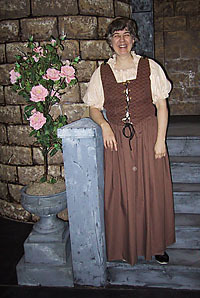 The prisoner of the tower of London is finally free. The run of Yeomen of the Guard (Gilbert and Sullivan) that has been absorbing all my spare hours concluded triumphantly with yesterday’s matinee, set-strike, and cast party, after Saturday performance wherein the leading man fell down the stairs (but landed on his feet AND delivered his line), and the overexcited chorus escaped the chorus-master’s control and beat the orchestra to the end of Act I by 2 full bars. Ah well, that’s what makes it live theatre.
The prisoner of the tower of London is finally free. The run of Yeomen of the Guard (Gilbert and Sullivan) that has been absorbing all my spare hours concluded triumphantly with yesterday’s matinee, set-strike, and cast party, after Saturday performance wherein the leading man fell down the stairs (but landed on his feet AND delivered his line), and the overexcited chorus escaped the chorus-master’s control and beat the orchestra to the end of Act I by 2 full bars. Ah well, that’s what makes it live theatre.
Category Archives: Music
A Child of Our Time
While running errands this morning I found my way into a used CD/records store and picked up a CD of a 1986 recording of Sir Michael Tippett’s A Child of Our Time. It’s in excellent condition and a very good recording: Andre Previn conducting the Brighton Festival Chorus, with Sheila Armstrong, Felicity Palmer, Philip Langridge and John Shirley-Quirk. When I sang “Child” in second year University, it was the first piece of twentieth century music I had ever encountered that was non-trivial, that addressed the heart of the twentieth century in the way the great religious works addressed the heart of previous centuries, and it brought the same sense of revelation as the poetry of Carl Sandburg, the other plays of Robert Bolt, and David Gascoyne’s overwrought but-man!-powerful passion-piece “Ecce Homo”. A recording is not the same as singing it, but it has lost nothing of its power of its jagged lyrics, its brilliant, jagged music, and the rumbling, roaring spirituals.
Theme music for a novel
In the process of trying to persuade my various software – including my hacked version of iTunes (I’m still running OS8.6) – to play MIDI files, I came across my collection of music associated with my current WIP: working title, Graveyards of Nereis:
- Sir Michael Tippett, A Child of Our Time
- The soundtrack from Gladiator
- The soundtrack from Alexander Nevsky, especially the alto solo “Field of the Dead”
- The “Dona nobis” from the recent Henry V
My original conception of the novel was both darker and more heroic than the way it is turning out. I am at the “sculpture under tension” phase – bits of it springing free and thwacking me – where I am trying to force into a shape and it is resisting. Whether I am pushing against something fundamental in its structure, trying to force the story (and, even more, the characters’ final destinies) athwart itself (themselves), or whether I simply do not have my technique right, is something I can only trust will become clear after the first draft. It would be a more powerful story if I let it become a tragedy. But I cannot yet see how to prevent the tragedy from bringing about a closure that would distort the rest of the story I want to tell.